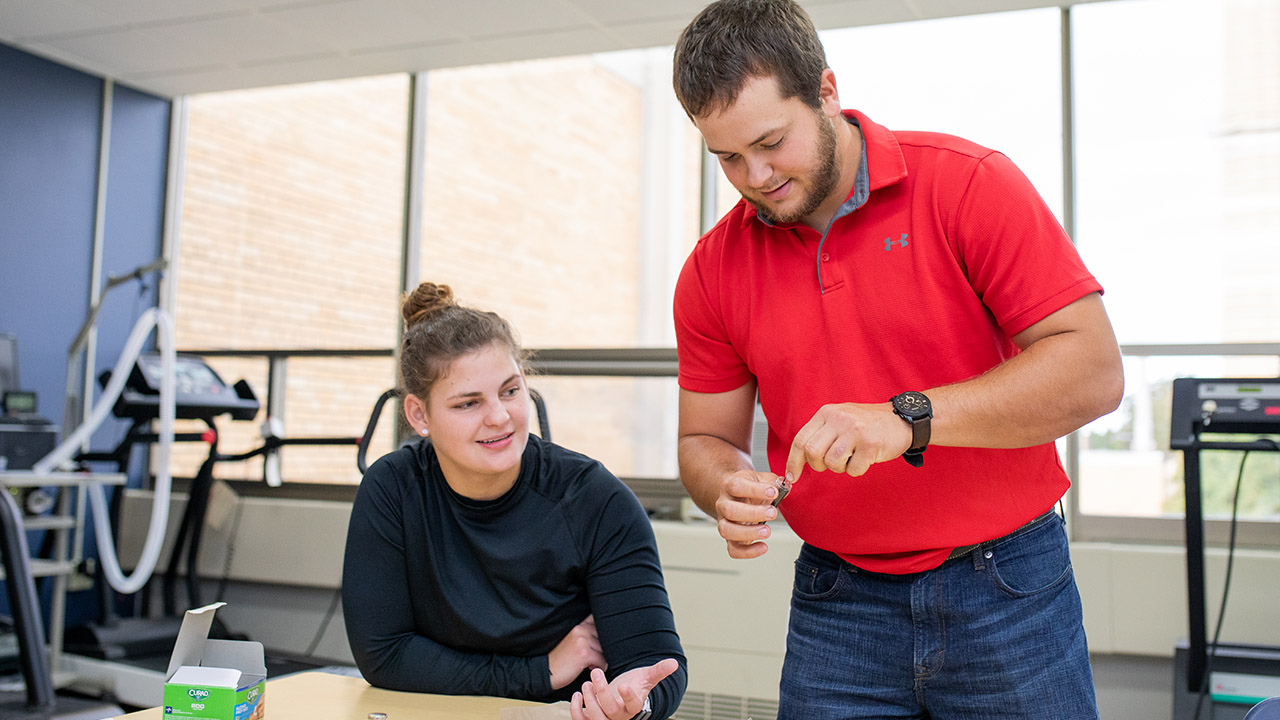
Interacting with students and giving them an opportunity to develop as young professionals in the field of exercise science is what inspires and motivates Dr. Ben Krings, CSCS, each day.
Krings, an assistant professor of health and human performance at the University of Wisconsin-Platteville since fall 2018, teaches courses in physiology of exercise, nutrition, strength and conditioning and fitness evaluation and prescription. The focus of his teaching is applying basic sciences in the format of labs and interaction with clients.
In addition to teaching, Krings is a certified strength and conditioning coach through the National Strength and Conditioning Association. In this capacity, he enjoys working with student-athletes to improve exercise techniques and sports performance. His research interests include the effects of macronutrients on sport and exercise performance and investigating various exercise modalities to improve training adaptations. He is an active member of the American College of Sports Medicine and the National Strength and Conditioning Association.
Over the past three years, Krings has served as a sweat tester for the Gatorade Sports Science Institute in the field. Listen to him talk about an experience from this summer.
Krings completed his undergraduate and master’s degrees at UW-Eau Claire and UW-La Crosse before he went to Mississippi State University for his Ph.D.
What is your teaching philosophy, and why is it important to you?
I believe that student success is based upon the experiences they gain every day during class and lab. My goal as an educator is to have students apply the basic fundamentals of exercise science to real life scenarios. Educating young adults can become very static, at times, and it is my philosophy to provide a dynamic classroom that will maximize the potential of my students. A majority of our exercise science students are looking to pursue graduate degrees, and they need to develop interpersonal skills and foundational knowledge to succeed in the field.
I am proud to be able to come back to teach in the UW System and the state I grew up in. The UW System allowed me to begin my dream of becoming an educator and researcher and I was lucky enough to get a job here at UW-Platteville.
Can you explain your work with student-athletes and how you improve their exercise techniques and sports performance?
As a certified strength and conditioning coach, I utilize my expertise in the field to mainly help our students learn how to develop strength and conditioning programs for athletes. Since I am a full-time assistant professor, I do not have the opportunity to interact with athletes on a daily basis, but I am looking for an opportunity in the future to help out with athletics in this capacity.
With my certification and membership to the National Strength and Conditioning Association, I have the opportunity to stay up-to-date with current research and trends in the field, but I also get our students involved with state, national and regional conferences. We also have students who are interested in strength and conditioning currently volunteering with athletics.
Your research interests include studying the effects of macronutrients on sport and exercise performance and investigating various exercise modalities to improve training adaptations. Can you explain some of the results of your research and why these areas interest you?
My research interests stem around the area of sports nutrition, specifically carbohydrates, fats and proteins. I mainly look at how manipulating macronutrient ingestion can affect sports performance. This includes the effects of carbohydrates on acute and chronic exercise performance and how higher fat diets affect health and performance.
A secondary interest of mine is to examine how we can optimize athletic training programs and performance. We completed a study with the softball team and were examining methods to improve their warm-up habits prior to at bats. It is my hope that we can develop relationships with athletic teams to maximize their potential success. This will also give our students valuable research experience in working with athletes.
I also worked with the men’s basketball team during the preseason to develop profiles of each player’s sweating rate. This was completed to help them understand fluid needs during completion. I also was able to talk sport nutrition habits with them. This fall, the plan is to work with the football team and other teams to optimize sports nutrition habits.
What hands-on learning activities will your students be doing this fall? How will these activities help prepare them for their future careers?
This fall, we are planning student-led research studies. There are approximately 10 students who are interested in helping out in this research. Some of these students will be presenting data at the Midwest American College of Sports Medicine Conference in Chicago in November. This will help develop students into young professionals and allow them to network with peers in the field.
Also this fall, students will have the opportunity to analyze diets and research areas of nutrition in a new Human Nutrition class we developed. In addition, this fall will mark our second semester of the Exercise Research Club, which was developed to give students the opportunity to learn, develop research ideas and complete research studies. Overall, our students are going to have opportunities in the classroom and outside of the classroom to maximize their experiences at UW-Platteville.
What is your hope for your students, for the short term and the long term?
In the short term, I hope that students develop a baseline of knowledge in the field of exercise science. From there, it is my goal to have our students pursue graduate degrees and become successful in the field. With the exercise science degree being relatively new, it will be important to continue to recruit and get students to understand the importance of this major to further develop our program as a whole.
To nominate someone for the Pioneer Spotlight, email pr@uwplatt.edu.